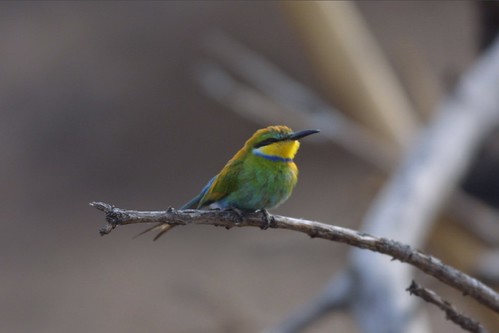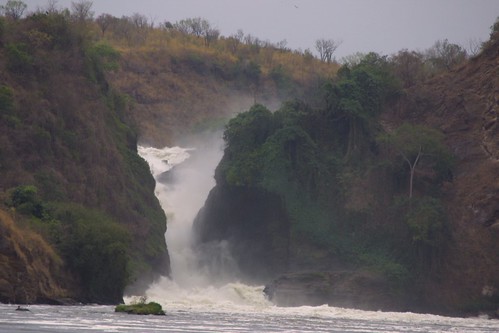A Letter From A Globetrotting Friend
I have been absorbed with job hunting (I have one month remaining as an Adjunct Professor until I am unemployed once more and on that depressingly rapid downhill slide towards sleeping on a bench in Central Park). Needless to say, I have been busy trying to deal with that while simultaneously working on data analysis as I try to finish writing a scientific paper that describes some of my postdoc research findings, so I have decided to allow a friend of mine write today's blog entry.
A long-time Seattle birding pal of mine, M, wrote a letter to me last week after returning from a bird watching trip overseas. I think his observations and thoughts about the areas he visited (even without an accompanying bird report), are quite interesting. All photographs are linked to larger versions that will appear in their own windows when clicked on. This letter and the accompanying photographs appear here with my friend's kind permission. Please respect his copyrights.

Swallow-tailed Bee-eater, Merops hirundineus [Photographer: MC, by permission]
Hi [my corporeal name],
I've been home for three weeks now. I am pleased to be back in Seattle, even with five weeks worth of mail and projects to catch up on. I was delighted to arrive home at the height of the flowering tree season, with my red currant and Indian plum looking great in the yard. I'm sure the local Anna's hummer is enjoying it even more than I am, from his frequent trips for nectar. I also have several early native plants about to bloom, like trilliums, phlox and shooting stars.
No trip report to come for a while, as I've not really had time to sit down and work it all out. I figure that we saw about 400 bird species in Uganda, probably a third of which were new to me. Not so many new mammals, but gorillas and chimps were among them. I don't really care for chimps -- too bloodthirsty (like humans) -- but I'm glad they are running free somewhere in the world. I did more birding in the UK than I had anticipated, thanks to my friend, RD, and added six life birds there as well.
[GrrlScientist Note: "life birds" are those species that have been added to a bird watcher's life list of all avian species ever seen in real life]
I have widely scattered observations, thoughts, whatever, regarding both Uganda and the UK, in no particular order. Let me throw a few your way: I would never, for example, recommend Uganda as a first destination in Africa. It is not an easy country to explore, and the wildlife is not as varied as that of Kenya, Tanzania or the several southern African countries. On the other hand, gorillas, chimps, giant forest hog and elephant shrew are probably not seen very often anywhere else. There were hard days of travel between the Impenetrable Forest of Bwindi, Queen Elizabeth Park and Murchison Falls Park, moving on bad, horribly corrugated road surfaces and sharing with often dense populations of people and their animals using these roads.

Murchison Falls, Uganda. [Protographer: MC, by permission]
Considering that Uganda was one of the first countries to suffer greatly from AIDS, I was astonished at the vast numbers of people. The best guess by the UN is that there is now a population of 26 million and that number will triple by 2050. The people look healthy -- not any fat showing, that's for sure! -- But the long-term projection is troublesome. There simply is not enough land to sustain everyone and there certainly are not enough jobs to go around. Signs of AIDS are few, though there are great numbers of abandoned buildings that make visitors suspect that someone may have died there and that the next generation has chosen not to stay in that house. The government says that HIV infections are down by 30% and there are many programs promoting chastity and/or safe sex.
Schools are everywhere, many related to churches and aid programs by other governments and charities, like Save The Children and World Vision. Although allegedly free, education still costs the poor significantly, as they must come up with school uniforms, notebooks, and other supplies out of what little money they earn. One secondary school we passed on our travels had this slogan on its sign: “Suffer Today, Live Tomorrow”. Anyway, we saw far more children walking to school than were tending the family cattle, so that was promising.
We spent two nights in the capital city of Kampala; with at least four million residents jamming its streets. Driving there -- or being a pedestrian -- has to be a nightmare. In four forays through the city, we came to only one traffic light. Somehow, traffic eventually moves but it seems somehow lawless and always dangerous. Almost all the taxis have slogans painted on the back that call on God or Allah (about 15% of Ugandans are Muslim) to protect them. Interestingly, the most dangerous place in the country for malaria is not at the national parks, but around the capital. The water is not safe to drink anywhere, so bottled water is provided wherever you travel.
One of the brighter spots for me was that the Uganda National Park system used local people extensively to work within the parks, particularly in Bwindi, where the gorillas live. Because so many locals find employment as rangers, porters and hotel staff, they seem to have more invested in making sure that the animals remain safe and that illegal activities like tree removal keeps to a minimum. I mentioned previously that I would not recommend Uganda for a first trip to Africa and the tourism infrastructure reflects its secondary status. The hotels are not up to the standards of many other countries (this could bring up the subject of ecotourism and its effects on local economies but I'll save that for another day) but the locals are unfailingly gracious and warm to visitors.
I was intrigued by the number of Ugandans who were speaking in English with each other. In Kenya or Tanzania, in the past, it was more likely that people of different tribes would be using Swahili as their lingua franca. It may well be that English will become dominant. It certainly would be more likely than a local tribal language gaining control.
Possibly in another week or so I'll find the time to sit down and work out a list of what I saw. Frankly, I am hoping that the Bird Holidays tour leader does most of that job for me! P sent out a report when I went with him to Spain last year, so I hope for something similar. Speaking of tour groups, our numbers included eight Brits and two Americans. I roomed with a 74-year old, J, from Vancouver, WA. J and I did well together. He had the biggest adventure of the tour, being knocked over by a warthog at one of our hotel stays. Fortunately, there was no major damage and he now has a story to share. It was a pretty congenial group, though some political issues came up from time to time.
Staying in the UK was a different story. I was stunned by how badly the dollar has dropped against the pound. It now takes more than two dollars to get a pound in exchange. The result is that London, already expensive, is way out of my price range. A chicken sandwich at a Burger King? Seven dollars. How about fish and chips for lunch? Fifteen dollars. There is not even the satisfaction of eating a superior meal at these prices! British food has not improved that much, believe me. Want gas for that expensive rental car? Six dollars a gallon (four dollars in Uganda, by the way). Sadly, it means that I will not drop into the British Isles for a visit again for a long time.
Politically, it was interesting. I was challenged by many Brits regarding our government. I think we remain liked as individuals but we [Americans] are not popular otherwise. I read a report in the Daily Telegraph, solicited from 776 young adults earlier this month that had some interesting results.
Heroes and Villains, for example: Villains included Osama Bin Laden at 87%, Al Qa'eda 85% and George Bush 49% but GWB was also a hero to 3%, many fewer than the leader, Nelson Mandela at 55%.
One bright spot regarding Britain: I loved the opportunity to take walks almost everywhere I went. There were wonderful paths along the seas, through pasturelands, around abandoned stone quarries converted to bird sanctuaries. It was great to have the chance to see old castles, Druid stones, and ponies of ancient pedigree, not to mention all the birdlife.
I lost a few pounds on the trip. My diabetes remains under control. No CPAP machine for two years... Now if I could only stop getting older!
I understand BL will be visiting with you soon. Enjoy being a guide!
Yers,
M
© 2004, 2005, 2006 by GrrlScientist











0 Peer Reviews:
Post a Comment
<< Home